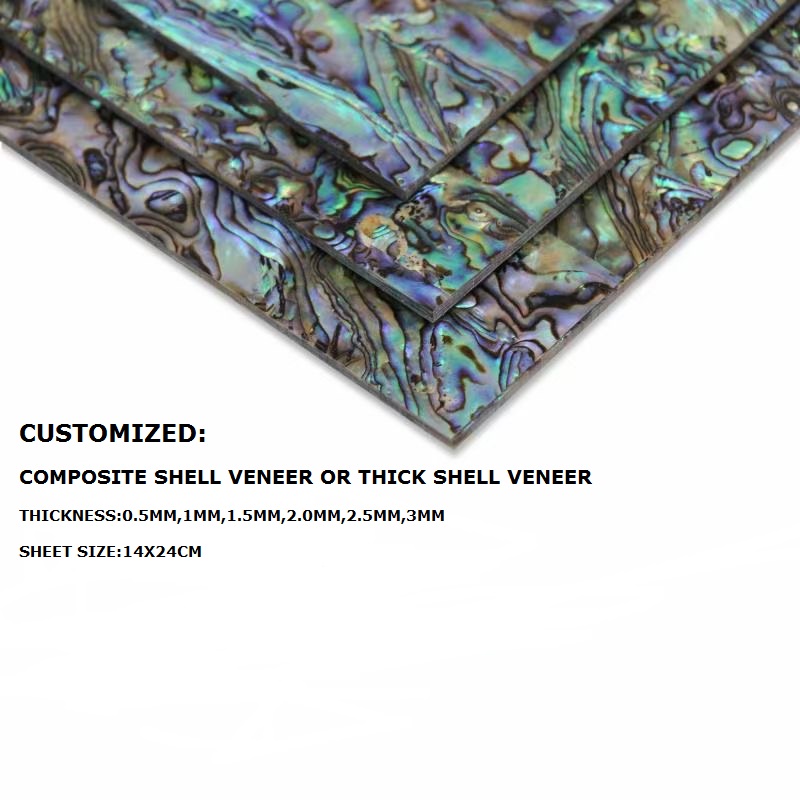What is flexible shell veneer or shell laminate?
Struggling to apply stunning shell finishes to curved items? Rigid materials crack, ruining the effect. Flexible shell veneer elegantly solves this, conforming beautifully to complex shapes.
Flexible shell veneer (or shell laminate) is a genuine mother-of-pearl sheet, meticulously processed with micro-cuts. This allows the naturally rigid shell to bend and conform to curved or uneven surfaces without breaking, perfect for unique applications.

Flexibile abalone shell veneer

Flexibile mother of pearl shell laminate
Now that you know what it is, you might be wondering how this amazing flexibility is achieved and where you can use it. Let's delve deeper into the secrets behind this versatile material.
Why can flexible shell veneer be flexible?
Ever wondered how brittle, natural shell can wrap around curves? Its inherent rigidity makes this seem impossible. The secret lies in a clever, precision manufacturing technique.
Flexibility isn't inherent to the shell itself. It's achieved through a process that creates microscopic, often diamond-shaped, fissures across the veneer surface using specialized blades. These tiny cuts allow the material to bend along many axes.

Flexibile angle wing shell veneer

Flexibile mexican shell laminate
The magic behind flexible shell veneer lies in precision micro-fissuring. Imagine the beautiful but rigid shell sheet. To make it pliable, we employ specialized, ultra-sharp blades to etch a dense pattern of tiny, interlocking cuts across the surface – often appearing as small diamond shapes when viewed closely. These aren't deep enough to compromise the overall structure but are sufficient to create thousands of miniature flex points.
Key Aspects of Flexibility:
- Micro-Cuts: These deliberate, patterned fissures (like the diamond shapes you might notice) allow movement between tiny segments of shell without snapping.
- Stress Relief: The cuts act as hinges, relieving the stress that would cause a solid sheet to crack when bent.
- Backing Support: Often, a thin backing material helps hold the small shell segments together during flexing and application, ensuring integrity.
Unlike standard rigid shell veneer, which is best for flat surfaces, this engineered flexibility opens up a world of design possibilities for curved applications, maintaining the shell's natural lustre throughout the bend.
How is flexible shell veneer made?
Transforming rigid mother-of-pearl into a flexible sheet sounds complex, doesn't it? It requires more than just slicing. Discover the careful process behind creating this versatile material.
First, high-quality shell pieces are selected and processed into thin, flat veneers. Then, specialized cutting tools create the crucial micro-fissure pattern. Often, a flexible backing is applied for support and ease of handling.
Creating flexible shell veneer is a meticulous process blending natural beauty with precise engineering. As a manufacturer committed to quality like Solar Shell, here’s a glimpse into the typical workflow:
- Raw Material Selection: We start with premium natural shells (Abalone, Mother of Pearl, etc.), chosen for their colour, lustre, and thickness.
- Initial Processing: Shells are cleaned, cut, and carefully ground or sliced into thin, uniform pieces.
- Veneer Assembly: These pieces are skillfully joined edge-to-edge, often onto a temporary substrate, forming a larger, thin sheet – the base rigid veneer.
- Micro-Fissuring: This is the critical step. Using highly specialized blades and precision machinery, the pattern of tiny cuts (like the diamond shapes) is etched across the veneer surface, imparting flexibility without sacrificing appearance.
- Backing Application: A suitable flexible backing (e.g., self-adhesive film, fabric) is applied. This stabilizes the fissured shell layer, making it easier to handle and apply.
Throughout this, quality control checks ensure consistency in flexibility, appearance, and durability – crucial for demanding applications.
What are the uses of flexible shell veneer?
Now you know how flexible shell veneer is made, but where can its unique bending ability shine? Limiting it to flat designs misses its true potential!
Flexible shell veneer is ideal for adding luxurious, natural shell finishes to curved or complex shapes. Think fishing lures, decorative inlays on musical instruments, knife handles, golf clubs, pens, furniture details, and even automotive trim.
The ability to conform to curves makes flexible shell veneer incredibly versatile. Its applications span various industries where a touch of natural iridescence is desired on non-flat surfaces, fulfilling client needs for inlaying on curved items:
- Sporting Goods: Adding irresistible allure to fishing lures, decorative elements on golf club shafts, archery bows, or custom knife handles.
- Musical Instruments: Creating intricate inlays on curved guitar headstocks, fretboards, soundhole rosettes, or violin bodies.
- Luxury Goods & Accessories: Decorating premium pens, watch faces, jewelry boxes, phone cases, or designer eyeglass frames.
- Interior Design & Furniture: Wrapping columns, detailing curved furniture components (like chair arms or table edges), bespoke wall features, or unique countertop edging.
- Automotive & Marine: Crafting custom dashboard accents, interior trim details, or high-end finishes in yacht interiors.
Essentially, anywhere a standard rigid veneer would crack or be impossible to apply smoothly on a curve, flexible shell veneer provides an elegant and captivating solution, significantly enhancing perceived value.
Conclusion
Flexible shell veneer uses micro-cuts to bring natural shell beauty to curved surfaces. Ideal for luxury goods, instruments, and decor, it offers unparalleled design freedom where rigidity fails.






